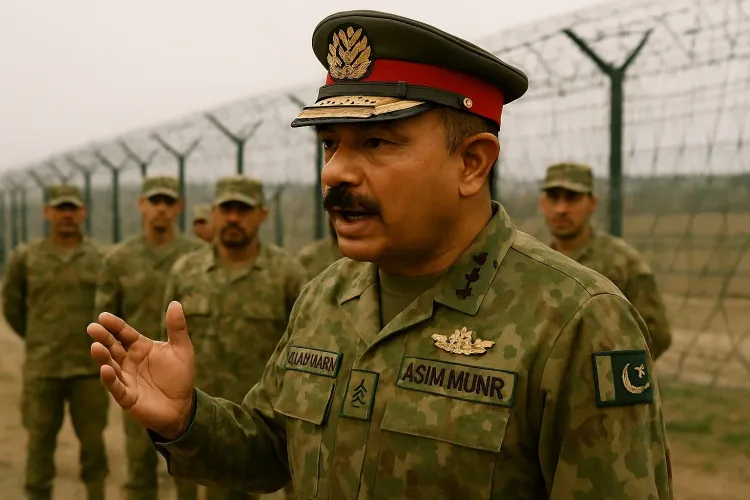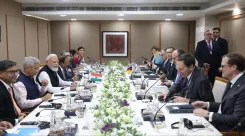Are the Independence Day Attacks a Sign of Pakistan's Struggle Against the TTP?

Synopsis
Key Takeaways
- Resurgence of TTP poses significant threats to Pakistan.
- Coordination with Afghan Taliban enhances TTP's capabilities.
- Majority of terror attacks in Pakistan attributed to TTP.
- Use of advanced weaponry by TTP, including drones.
- Potential merger with Al-Qaeda in the Subcontinent could increase lethality.
New Delhi, Aug 17 (NationPress) The Tehreek-e-Taliban Pakistan (TTP) has emerged as Pakistan's most significant security challenge. Initially formed by the Inter-Services Intelligence (ISI), the Pakistani establishment now finds itself in a constant struggle against this militant group.
On the occasion of Pakistan's Independence Day, the TTP executed a series of coordinated attacks across multiple districts in Khyber Pakhtunkhwa (KP).
In total, six districts experienced violence, resulting in the deaths of policemen and injuries to nine others during eight simultaneous assaults.
The attacks occurred in Upper and Lower Dir, Bannu, Hassan Khel, and Shangla.
The TTP claimed responsibility for the violence, stating it was part of their ongoing effort to undermine Pakistan's security establishment.
Over the years, the TTP has transformed into one of the world’s most perilous terrorist organizations.
The Global Terrorism Index 2025 lists it among the deadliest terror groups globally, alongside the Islamic State, Jamaat Nusrat Al-Islam, and Al-Shabab, which collectively accounted for the majority of global terrorist-related deaths in 2024.
Statistics reveal that these groups were behind the deaths of 4,300 individuals in 2024 alone.
Within Pakistan, the TTP is responsible for 90 percent of terrorist incidents. In 2024, it accounted for 558 of the 1,081 total terror-related deaths.
The TTP was initially created by the ISI to create discord within the Afghan Taliban.
While it initially remained loyal, it has increasingly turned against the ISI over time. Another significant issue for Pakistan is that, similar to the Balochistan Liberation Army (BLA), the TTP has systematically targeted Chinese interests within the country.
What was meant to be a tactic to divide the Taliban in Afghanistan has backfired drastically for the ISI and the Pakistan Army.
Now, with substantial backing from the Afghan Taliban, the TTP has become even more formidable. The terrorists involved in the Independence Day attacks reportedly infiltrated from Afghanistan.
Pakistan had previously managed to significantly reduce TTP operations, but since a resurgence began in 2021, their activities have escalated beyond control.
The shift of their operations to the Khyber Pakhtunkhwa region has made the group even more dangerous, as this area borders Afghanistan, allowing easier access for TTP operatives.
The Afghan Taliban's support further enhances the TTP’s capabilities.
Prior to 2020, the Pakistan military launched 'Operation Zarb-e-Azb', which effectively dismantled TTP leadership.
However, following the U.S. withdrawal from Afghanistan, the TTP seized the opportunity to reinvigorate its operations in Pakistan.
It has since united several splinter factions and reorganized the terror group.
Al-Qaeda has also lent its support to the TTP.
The relationship between the Pakistan establishment and the Taliban has soured due to this collaboration, with Pakistan accusing the Taliban of supporting the TTP, causing tensions in Kabul.
Regardless of the diplomatic relations between Pakistan and Afghanistan, the TTP has asserted it will not relent. Recently, they released an infographic claiming responsibility for the deaths of 139 Pakistani soldiers in July 2025.
Adding to Pakistan's woes is the sophisticated arsenal employed by the TTP, much of which consists of weapons abandoned by NATO during their withdrawal.
During the Independence Day attacks, the TTP utilized drones alongside conventional weaponry in their eight simultaneous assaults.
The United Nations estimates that the TTP has around 6,500 fighters and is actively seeking to bolster its ranks.
According to the UN, the TTP could evolve into an umbrella organization for other terrorist groups. Discussions of a merger between the TTP and Al-Qaeda in the Subcontinent (AQIS) have surfaced, which could significantly enhance the group’s threat level.










